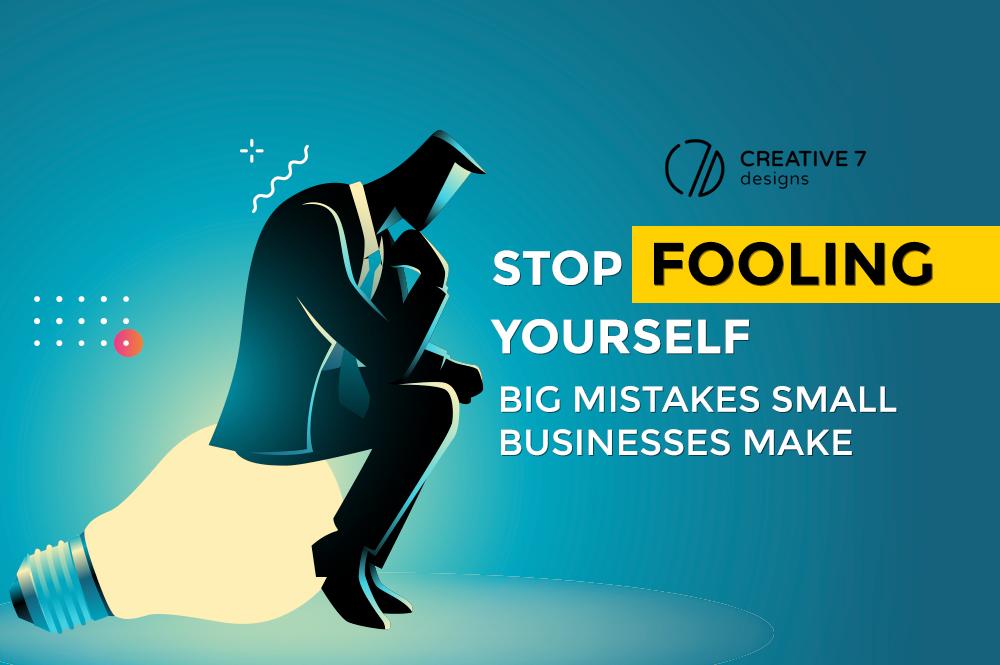It’s April, but you don’t have to make common foolish mistakes as a small business owner to take part in the Fools’ Day.
One article reminds us that no matter how steeped you are in business-ownership experience, you are bound to run into problems at some point. So, the month of April is a good opportunity for business owners to reflect on foolish mistakes that could ruin their business (given it’s the month of “fools” and all).
Some of the most foolish mistakes a business owner could make might not even be obvious. Thankfully, a lot of these problems are avoidable and, in the long-term, will benefit your business more than you think if you take appropriate steps to avoid them.
Consider some of the following mistakes that SBOs tend to make (numbered in no particular order):
Get-rich-quick mentality
Overconfidence/”no” competition
Jack of all trades/not utilizing team members
Premature product launch
No business credit/proper funding
Doing what you want, not what the customer is asking for
Neglecting digital presence (social media, website, reviews, etc.)
Some common mistakes made by small business owners could be avoided, though. Let’s take a look at how small businesses make these mistakes and how to avoid them.
1. Getting rich quick will lead to long-term disappoint
Overnight success usually takes 15 to 20 years to achieve. If you go in expecting to be rich overnight, you may become discouraged early on (this could lead to you giving up your dream prematurely). If you understand that success takes time, perseverance, and preparation, you can avoid this detrimental mentality. The key is to give your business time to grow. If your company is stagnant for a long time, you can take it as an indication that you need to try something new. However, many small businesses that are starting up should get comfortable with time — this will either make or break your success.
2. Overconfidence, or assuming you have no competition because your product is a "breakthrough," will bite you in the butt
Even if you have the latest, greatest, never-been-done-before approach to something, don’t assume that you have no competition. Competition is more than just the direct, obvious competitors. Competition is also all the available alternatives. If you create a breakthrough product, chances are other companies in your field will find your product and start asking questions to capitalize on your product. This isn’t to discourage you from continuing with your product, but convincing yourself that you’re going to remain the “one-and-only” is only going to set yourself up for failure. Competition does exist, and that’s okay.
3. Doing everything on your own... poorly instead of delegating tasks to appropriate team members
You might want to do it all by yourself, but we don’t recommend it. Just like any other person, an entrepreneur has one or two natural talents. As an entrepreneur, it is your job to identify those talents and focus on them to your fullest. So, it’s important to build a strong, well-rounded team. Find people who are strong in the areas that you aren’t. Effective delegation can be one of the best ways for SBOs to build their businesses, free up their time for business activities that require their unique expertise, and build a team positioned for future success. While you can do almost everything, you don’t want to do almost everything poorly.
4. Launching your business or product prematurely
Your product isn’t ready, but you are. This is when the Nike slogan isn’t going to work — Don’t just do it. One of the biggest mistakes startups make is launching before they are ready. The saying ‘done is better than perfect’ is the right advice, however, the ‘done’ needs to ensure it can handle new clients. Once you have launched into the public and you start getting clients, ensure that your systems and processes are in place, such as payment terms and process, contracts, communications, whilst still being able to maintain your marketing strategy. The back-end processes need to be watertight before you start taking on clients; if they aren’t, these are the cracks that will show and appear unprofessional. You likely won’t have a “perfect” product, but it’s best to get it as close as possible to “perfect” rather than rush with a mediocre product.
5. Not paying attention to business credit when it comes to finding proper funding
One business owner said that part of the reason 30 percent of businesses fail within the first three years is because of lack of proper funding. Similar to personal credit, business credit determines whether your company can be trusted by the way it manages money. The thing is: Most banks will not trust a new business owner with a loan unless they have collateral to back it up, and most people put a lot of their money into trying to develop something profitable when starting a new venture. Is that is a catch-22 situation? Not necessarily. Building your business credit enables you to obtain the capital you need to expand, cover everyday expenses, purchase inventory, hire additional staff, and conserve the cash on-hand to cover your cost of doing business.
6. Only doing what you want instead of listening to customer needs
This tip has its place in the world of business. At some point, you do what you want because you don’t even have a customer base, but once you do get a customer base, you start to pay more attention to their requests. Customers are the most important part of a business because they are literally what keeps you in business. If you don’t consider their needs and their satisfaction as one of your primary goals, you’ll lose them so remember to meet their needs and treat them as individuals when the time comes and, as we stated before, the time comes when you do get a loyal customer base that actually begins to make requests.
7. Neglecting your digital presence (social media, website, reviews, etc.)
Here’s a statistic: 74 percent of American adults internet users use Facebook. Regardless of opinion, your potential customers are on various social media networks. If you are a business owner or work for a business that refuses to have social media, you’re missing out! Especially since this number will only increase in time as the world gets more mobile. And having a website lets the business tell their story while providing useful information for clients. It’s also a great gateway to gain additional traffic with search engines. But creating a website and having a social media presence isn’t enough for your business. Don’t neglect reviews on social media pages and review sites such as Yelp and Google! Thank customers for good reviews and respond to the critical reviews to show other potential clients you care.
Along with the 7 tips mentioned above, be sure to check out some of the articles cited in this blog to get more information on other mistakes SBOs tend to make:


